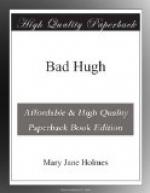In this escape Anna was particularly interested, as it had helped to make her the delicate creature she was, for since the morning when she had knelt at her proud father’s feet, and begged him to revoke his cruel decision, and say she might be the bride of a poor missionary, Anna had greatly changed, and the father, ere he died, had questioned the propriety of separating the hearts which clung so together. But the young missionary had married another, and neither the parents nor the sisters ever forgot the look of anguish which stole into Anna’s face, when she heard the fatal news. She had thought herself prepared, but the news was just as crushing when it came, accompanied, though it was with a few last lines from him. Anna kept this letter yet, wondering if the missionary remembered her yet, and if they would ever meet again. This was the secret of the missionary papers scattered so profusely through the rooms at Terrace Hill. Anna was interested in everything pertaining to the work, though, it must be confessed, that her mind wandered oftenest to the banks of the Bosphorus, the City of Mosques and Minarets, where he was laboring. Neither the mother, nor Asenath, nor Eudora ever spoke to her of him, and so his name was never heard at Terrace Hill, unless John mentioned it, as he sometimes did, drawing comical pictures of what Anna would have been by this time had she married the missionary.
Anna only laughed at her wild brother’s comments, telling him once to beware, lest he, too, follow her example, and was guilty of loving some one far beneath him. John Richards had spurned the idea. The wife who bore his name should be every way worthy of a Richards. This was John’s theory, nursed and encouraged by mother and sisters, the former charging him to be sure and keep his heart from all save the right one. Had he done so?




